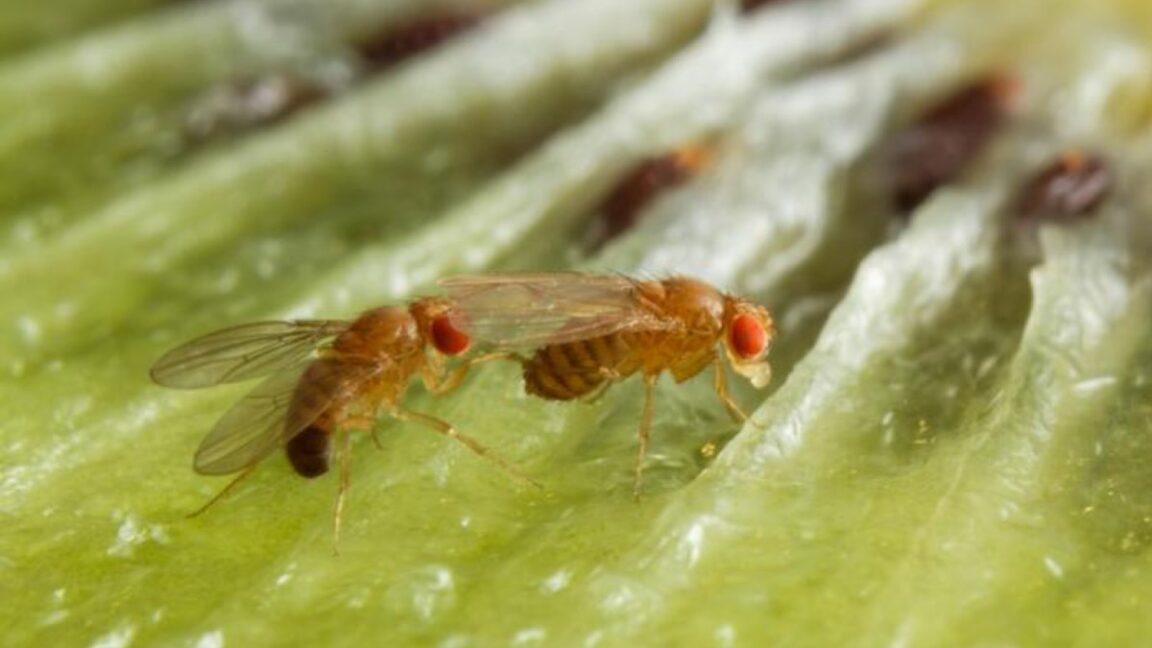Alcohol makes male fruit flies sexier by stimulating the production of sex pheromones.
Fruit flies (Drosophila melanogaster) are tremendously fond of fermented foodstuffs. Technically, it's the yeast they crave, produced by yummy rotting fruit, but they can consume quite a lot of ethanol as a result of that fruity diet. Yes, fruit flies have ultra-fast metabolisms, the better to burn off the booze, but they can still get falling-down drunk—so much so, that randy inebriated male fruit flies have been known to court other males by mistake and fail to mate successfully.
Then again, apparently adding alcohol to their food increases the production of sex pheromones in male fruit flies, according to a new paper published in the journal Science Advances. That, in turn, makes them more attractive to the females of the species.
"We show a direct and positive effect of alcohol consumption on the mating success of male flies," said co-author Ian Keesey of the University of Nebraska, Lincoln. "The effect is caused by the fact that alcohol, especially methanol, increases the production of sex pheromones. This in turn makes alcoholic males more attractive to females and ensures a higher mating success rate, whereas the success of drunken male humans with females is likely to be questionable."
Fruit flies are the workhorses of modern genetics research, used to study everything from cancer to sleep disorders. They make excellent model systems because they share so many genes with humans, plus they are cheap, easy to breed, and can be genetically altered easily. Many years ago, I had the privilege of visiting the University of California, San Francisco laboratory of behavior geneticist Ulrike Heberlein, who spent years getting fruit flies drunk in an "Inebriometer" to learn about the various genes that influence alcohol tolerance. (Heberlein is now scientific program director and laboratory head at the Howard Hughes Medical Institute's Janelia Farm Research Campus.)
Driven to drink?
For instance, Heberlein co-authored a 2012 paper discussing experimental results that suggested romantic rejection (i.e., "social defeat") could drive male fruit flies to drink. She paired virgin males with females who had already mated for an hour at a time, three times a day, for four straight days. (Mated females will vehemently reject advances from other males, often aggressively so.) Then the males were placed in an alcohol-drinking assay, where they would drink more than twice as much alcohol as male fruit flies in the control group who had successfully mated.

In terms of a mechanism, the rejection seems to decrease levels of a neuropeptide in the brain, which increases after mating, leading Heberlein et al. to conclude that drinking the ethanol activates reward centers in the fruit fly brain. The end goal is to find equivalent mechanisms in the human brain to guide future interventions into human drug and alcohol addiction and abuse.
While their latest findings are generally consistent with this and other fruit fly studies, Keesey and his co-authors offer an alternative hypothesis to explain these alcohol-related behaviors in fruit flies. They concluded that fruit flies "are attracted to ethanol (and methanol) not as a means to cope with the negative psychological effects of mate rejection, but rather that flies are driven toward these alcohols to increase their chances for subsequent mating success," they wrote. In other words, rejected male fruit flies chug down alcohol as a strategy to get girls to like them.
The researchers studied the behavioral responses of male fruit flies using an experimental apparatus called a Flywalk, in which 15 fruit flies in individual glass tubes lined up in parallel were exposed to odors (including ethanol and methanol) and monitored for their responses to those odors. They also employed imaging techniques to visualize what was happening in those tiny fruit fly brains.
The results: In keeping with prior research, male fruit flies who had not yet mated were more drawn to alcohol. Those that consumed methanol showed a marked increase in the levels of pheromones known to be involved with the elaborate fruit fly courtship rituals. And males who had access to natural sources of methanol, like fermented oranges, were more successful in attracting females than males who did not. Of course, when it comes to alcohol, there can be too much of a good thing. Keesey et al. also found that too much methanol can kill the flies.
"What is unique about our results is that we found not just one, but three neural circuits that we were able to show actually balance each other in terms of this risk assessment, that is, attraction and aversion," said Keesey. "This means that the flies have a control mechanism that allows them to get all the benefits of alcohol consumption without risking alcohol intoxication. That different neural pathways with opposite valence for the same odor are combined to balance attraction and aversion based on physiological state is a rarity."
So male fruit flies, essentially, know when they've reached the optimal level of inebriation to attract more females and successfully mate, before they become so intoxicated that they repulse the females, or approach other males by mistake.
Science Advances, 2025. DOI: 10.1126/sciadv.adi9683 (About DOIs).
Hope you enjoyed this news post.
Thank you for appreciating my time and effort posting news every day for many years.
News posts... 2023: 5,800+ | 2024: 5,700+ | 2025 (till end of March): 1,357
RIP Matrix | Farewell my friend ![]()



3175x175(CURRENT).thumb.jpg.b05acc060982b36f5891ba728e6d953c.jpg)


Recommended Comments
There are no comments to display.
Join the conversation
You can post now and register later. If you have an account, sign in now to post with your account.
Note: Your post will require moderator approval before it will be visible.